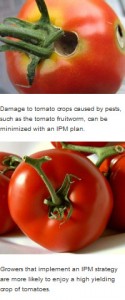Integrated Pest Management-Tomatoes
go.ncsu.edu/readext?183891
en Español / em Português
El inglés es el idioma de control de esta página. En la medida en que haya algún conflicto entre la traducción al inglés y la traducción, el inglés prevalece.
Al hacer clic en el enlace de traducción se activa un servicio de traducción gratuito para convertir la página al español. Al igual que con cualquier traducción por Internet, la conversión no es sensible al contexto y puede que no traduzca el texto en su significado original. NC State Extension no garantiza la exactitud del texto traducido. Por favor, tenga en cuenta que algunas aplicaciones y/o servicios pueden no funcionar como se espera cuando se traducen.
Português
Inglês é o idioma de controle desta página. Na medida que haja algum conflito entre o texto original em Inglês e a tradução, o Inglês prevalece.
Ao clicar no link de tradução, um serviço gratuito de tradução será ativado para converter a página para o Português. Como em qualquer tradução pela internet, a conversão não é sensivel ao contexto e pode não ocorrer a tradução para o significado orginal. O serviço de Extensão da Carolina do Norte (NC State Extension) não garante a exatidão do texto traduzido. Por favor, observe que algumas funções ou serviços podem não funcionar como esperado após a tradução.
English
English is the controlling language of this page. To the extent there is any conflict between the English text and the translation, English controls.
Clicking on the translation link activates a free translation service to convert the page to Spanish. As with any Internet translation, the conversion is not context-sensitive and may not translate the text to its original meaning. NC State Extension does not guarantee the accuracy of the translated text. Please note that some applications and/or services may not function as expected when translated.
Collapse ▲
 Integrated Pest Management, or IPM, is the coordinated use of pest and environmental information along with available pest control methods, including cultural, biological, genetic and chemical methods, to prevent unacceptable levels of pest damage by the most economical means and with the least possible hazard to people, property and the environment.
Integrated Pest Management, or IPM, is the coordinated use of pest and environmental information along with available pest control methods, including cultural, biological, genetic and chemical methods, to prevent unacceptable levels of pest damage by the most economical means and with the least possible hazard to people, property and the environment.
N.C. State University Plant Disease and Insect Clinic
The Plant Disease and Insect Clinic at N.C. State University provides disease diagnostic and insect identification services to help growers produce healthy plants and crops. Extension specialists from Plant Pathology, Entomology, Horticultural Science, Crop Science and Soil Science diagnose problems on the samples received.
North Carolina Agricultural Chemicals Manual
This manual provides growers, Extension personnel, researchers and other agricultural professionals with the most up-to-date information available on the selection, application, and safe and proper use of agricultural chemicals. The online version is updated as changes in recommendations occur throughout the year.
North Carolina Pest Management Information Program
The program serves as an information resource on current agricultural pest management practices, problems and issues relevant to North Carolina. Timely, science-based pest management and pesticide information is available.
Pests of the Tomato
Tomatoes are attacked by a large number of insect pests from the time plants first emerge in the seedbed until harvest. Aphids, flea beetles, and leafminers threaten young transplant-bed tomatoes. In the field, flea beetles, aphids, leafminers, stink bugs, and tomato fruitworms cause minimal damage to the foliage; however, severe damage may result either from their feeding on the fruit or by their spreading of diseases.
Pesticides and Farmworker Health Toolkit
This toolkit is an educational resource to teach pesticide safety to Spanish-speaking agricultural workers with limited formal education. The toolkit was approved by the U.S. Environmental Protection Agency for federal Worker Protection Standard worker training requirements. Toolkits are available in Spanish and English for a variety of crops, including tomatoes.
Reviewed and updated by Jeanine Davis on 5/12/2023


